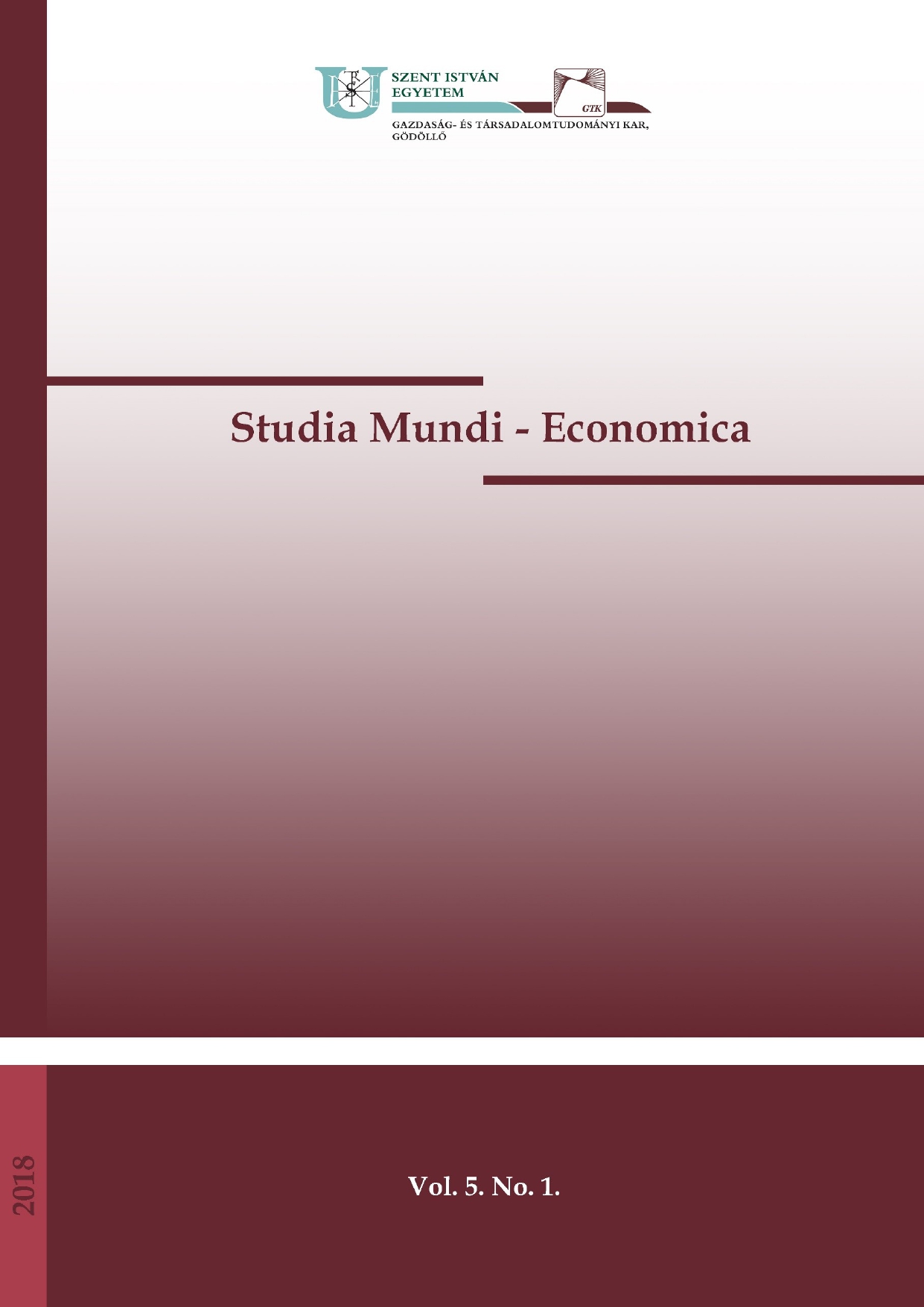Special features and problems of rural society in Hungary
DOI:
https://doi.org/10.18531/Studia.Mundi.2018.05.01.98-112Kulcsszavak:
ageing, outmigration, social problems, Roma minority, rural developmentAbsztrakt
One of the basic pillar but also the indicator of rural security is the state of the social processes at a specified region. These are significantly related to the economic, environmental and developmental status of a given country, region, micro-region. Basically, the population of more developed areas shows more favorable demographic trends, while social problems are less or in some other form than in less developed, disadvantaged areas. In Europe and Hungary, the underprivileged, peripheral rural areas have to face aging, migration and economic, social and environmental problems as results. What is more, the occasionally favourable demographic trends can often be related to the slumificating of the disadvantaged population. Based on the general situation of rural areas, this article attempts to summarize the typical social situation and main problems of domestic rural areas, relying on the relevant literature, the strategic documents of the EU and Hungary, and secondary data.
Hivatkozások
Bengs, C. - Schmidt-Thome, K. (eds.) (2005): Urban-rural relations in Europe, ESPON Project 1.1.2 Part 1: Final Report. Helsinki: Centre for Urban and Regional Studies, University of Technology
Clout, H. (1993): European Experience of Rural Development. Report for the Rural Development Commission. Strategy Review: Topic Paper no. 5. London: Department of Geography, University College London
Csite, A. - Kovách, I. (2002): Vidéki történet. (Rural story). In: Kovách, I. (ed.): Hatalom és társadalmi változás. A posztszocializmus vége. Budapest: Napvilág. pp. 217-308.
Csite, A. (2005): Reménykeltők. Politikai vállalkozók, hálózatok és intézményesülés a magyar vidékfejlesztésben 1990-2002 között. Budapest: Századvég
EC (2008): Poverty and social exclusion in rural areas. Final study report. Luxembourg: European Commission, Directorate General for Employment, Social affairs and Equal opportunities
EC (2012): A view on employment, growth and innovation in rural areas. SWD(2012) 44 final. Commission staff working document. European Commission: Brussels
EC (2016): CAP Context Indicators 2014-2020 - 2016 update.
Enyedi, Gy. (1998): A városnövekedés szakaszai. (Phases of urban sprawling). Budapest: Akadémia Kiadó, 115 p
Eurostat (2012): Focus on territorial typologies. In: Eurostat Regional Yearbook, 2012. Luxembourg: Publications Office of the European Union. pp. 193-201.
Eurostat (2015): Regions in the European Union. Nomenclature of territorial units for statistics. NUTS 2013/EU-28.
Eurostat (2017): Eurostat Regional Yearbook, 2017. Luxembourg: Publications Office of the European Union.
Fiss, P. C. - Hirsch, P. M. (2005): The discourse of globalization: Framing and sensemaking of an emerging concept. American Sociological Review (2) pp. 29-52.
Heilig, G. K. (2002): European Rural Development (ERD). Project Description. Laxenburg, Austria: International Institute for Applied Systems Analysis
Kirby, P. (2006): Theorising globalisation’s social impact: proposing the concept of vulnerability. International Political Economy (4) pp. 632-655.
Kovács, T. (2003): Vidékfejlesztési politika. (Rural Development Policy). Budapest-Pécs: Dialóg Campus
Kulcsár, L. - Brown, D. L. (2005): Modernizáció és Vidékfejlesztés (Modernisation and Rural Development). Korunk (4) pp. 10-15.
lbery, B. - Bowler, I. (1998): From agricultural productivism to post-productivism. In Ilbery, B. (ed.): The geography of rural change. London: Longman. pp. 57–84.
NDTDP (2014): National Development and Territorial Development Program. (NEMZETI FEJLESZTÉS 2030 - Országos Fejlesztési és Területfejlesztési Koncepció). Magyar Közlöny (1) pp. 10-299.
NSIS (2014): National Social Inclusion Strategy II. (Magyar Nemzeti Társadalmi Felzárkózási Stratégia II. Tartósan rászorulók - szegény családban élő gyermekek -romák (2011–2020). Frissített változat). Budapest: Emberi Erőforrások Minisztériuma, Szociális És Társadalmi Felzárkózásért Felelős Államtitkárság
OECD (1994): Creating rural indicators for shaping territorial policy. Paris: OECD
OECD (2006): The New Rural Paradigm. Policies and Governance, Paris: OECD
Patrick, J. D. (1997): A rurális térségek fejlesztésének problémái és prioritásai Írországban. (Problems and priorities of rural development in Ireland). In: Horváth, Gy. (ed.): Régiók felemelkedése és hanyatlása. Regionális átalakulás a Brit-szigeteken. Pécs: MTA RKK. pp. 139-150.
Ray, C. (1998): Culture, Intellectual Property and Territorial Rural Development. Sociologia Ruralis (1) pp. 3-20.
RDP (2014): Rural Development Program of Hungary. Budapest: Prime Ministry
SEGIRA (2010): Study on employment, growth and innovation in rural areas. European Commission: Brussels
Starosta, P. (1994): Ruralization and Rurality: Three Perspectives. In: Symes, D. - Jansen, A. J. (eds.): Agricultural Restructuring and Rural Change in Europe. Wageningen: Agricultural University. pp. 65-74.
Swinburn G. - Goga S. - Murphy F. (2004): Handbook of Local Economic Development. Gütersloh: Bertelsmann Stiftung; London: UK DFID; Washington D.C.: The World Bank
Szilágyi T., Boldizsár G.: (2016) A biztonságos vidék, mint az állam létfeltétele PRO SCIENTIA RURALIS 1:(4) pp. 24-34.
Tovey, H. (2001): Creating and re-creating modernity: peasantisation and depeasantisation in Ireland. In: Granberg, L.- Kovách, I. (eds.): Europe’s Green Ring. Ashgate: Aldershot. pp. 306-329.
Valér, É. (1987): Az urbanizálódás falvakat érintő fő sajátosságai. (Main rural characteristics of urbanisation) A Falu (2) pp. 31-37.
Wade, R. H. (2003): The Disturbing Rise in Poverty and Inequality: Is It All a “Big Lie”? In: Held, D. - Koenig, A. M. (eds.): Taming Globalization: Frontiers of Governance. Cambridge: Polity Press. pp. 18-46.
Letöltések
Megjelent
Folyóirat szám
Rovat
License
Copyright (c) 2018 Krisztián Ritter

This work is licensed under a Creative Commons Attribution-NonCommercial-NoDerivatives 4.0 International License.
A folyóirat Open Access (Gold). Cikkeire a Creative Commons 4.0 standard licenc alábbi típusa vonatkozik: CC-BY-NC-ND-4.0. Ennek értelmében a mű szabadon másolható, terjeszthető, bemutatható és előadható, azonban nem használható fel kereskedelmi célokra (NC), továbbá nem módosítható és nem készíthető belőle átdolgozás, származékos mű (ND). A licenc alapján a szerző vagy a jogosult által meghatározott módon fel kell tüntetni a szerző nevét és a szerzői mű címét (BY).






